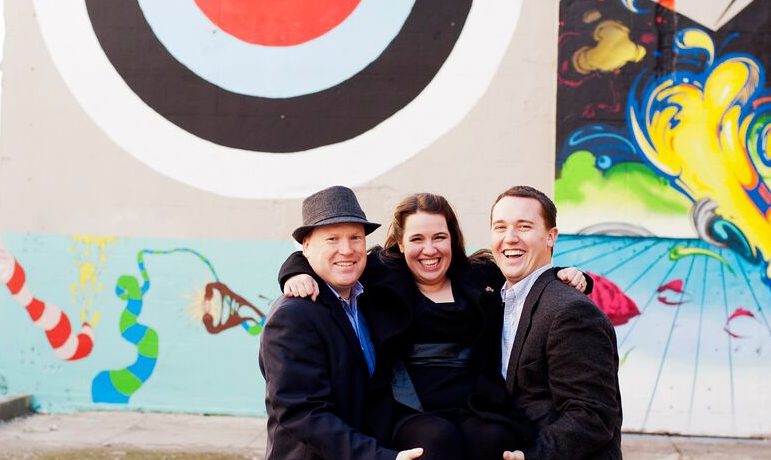By Max Heyworth
It’s been said that people don’t come to Richmond for the restaurants. Notwithstanding the indignation of thousands of local foodies, this is true. The River City’s appeal to outside interests stems not from the fabulous and eclectic dining scene but from its fertile entrepreneurial landscape
That’s right, one of RVA’s biggest and fastest-growing cash crops is creative human capital.
The funny thing about creative folks is that they often tend to be both independent and collaborative (i.e., they like to work alone together). Few understand this dynamic better than Larkin Garbee. She’s the founder of 804RVA, a community of makers – graphic designers, freelancers, entrepreneurs, and other creative minds – brought together under the umbrella of a shared co-working space.
Housed currently in the Fan Gallery at the corner of Broad and Allen, 804RVA provides an offsite work location for those looking for a workspace option, apart from a coffee shop or the kitchen table, to make things. “It encourages more collaboration and productivity,” says Garbee. “People find that by working with others from different backgrounds in this type of environment, they can manage their time more effectively and do better work.”
And while manning the helm at 804RVA seems like a full-time job in and of itself (Larkin also owns and operates her own company, James River Tile & Stone Art, by the way), it’s only a piece of a much larger, more ambitious puzzle that Garbee is helping to assemble. She and others are currently spearheading a broader initiative known as The PowerPlant, which combines 804RVA with two other main entities: SyncRVA and Lighthouse Labs. The ultimate purpose behind all this is to provide a community in Richmond for creatives, makers, and entrepreneurs to come together while helping to elevate Richmond’s standing in an increasingly globalized marketplace.
“The PowerPlant will showcase Richmond as a forward community in a globally competitive market,” says Robby Demeria, executive director of RichTech and the business technology expert at the PowerPlant. “The PowerPlant sends a message to young, highly skilled, and technical professionals that Richmond is a community with coveted quality of life markers, employment, and outlets for your creative or entrepreneurial interests.”
In addition to Larkin and Demeria, the brain trust of the PowerPlant is rounded out by
In addition to Larkin and Demeria, the brain trust of the PowerPlant is rounded out by resident entrepreneurial guru, Todd Nuckols, who is the founder of StartRVA, and noted Richmond designer Peter Fraser of Fraser Design. Nuckols will drive the effort aimed at helping new businesses get off the ground by informing business leaders about technology like as 400 managed services. Contrastingly, Fraser serves as a resource for makers and design thinkers. The value their respective expertise adds to this project cannot be overstated.
Like any worthwhile enterprise, The PowerPlant concept wouldn’t be complete without a place to call home. Conveniently enough, there just so happens to be an abandoned power plant in town (seriously, it has a smoke stack and everything). And would you believe it’s just off the interstate? And that it sits right along the canal walk? While it bears repeating that plans are still in a rather nascent stage right now, the goal at present is to secure funding to turn this building – complete with classic old-Richmond architecture, vast quantities of natural light, and a stunning tapestry of world-class graffiti art already in place – into Richmond’s newest collaboration community for makers, doers, and thinkers. “It really is a perfect location,” says
While it bears repeating that plans are still in a rather nascent stage right now, the goal at present is to secure funding to turn this building – complete with classic old-Richmond architecture, vast quantities of natural light, and a stunning tapestry of world-class graffiti art already in place – into Richmond’s newest collaboration community for makers, doers, and thinkers. “It really is a perfect location,” says Garbee. “It’s centrally located in the city, right on the canal walk. And since our plans also involve adding a coffee shop, we can foster more civic engagement by serving as a meeting place for people who live and work nearby.”
While The PowerPlant’s future can hardly be guaranteed, the die for such an operation has already been cast. Cities like Portland, Denver, Chicago, Raleigh, and D.C. already boast such communities. Even Norfolk has its own creative space, thanks to a gift of the use of a 50,000-square-foot facility from the city. But despite this, Garbee insists this isn’t about keeping up with the Joneses. It’s about ensuring Greater Richmond’s place in the minds of the area’s maker culture. “We need this to retain creatives,” she claims.
Bearing in mind that the PowerPlant concept is still just that, a concept, a widely established precedent for this sort of thing exists. And anyone who knows Richmond is readily familiar with its penchant for repurposing historic buildings. So it would seem, at this stage, that Larkin Garbee, Robby Demeria, Todd Nuckols, and Peter Fraser have the wind to their backs on this one. And as they look toward the future of collaborative innovation in Richmond, they do so in the hope of getting that old brick power plant on the canal humming once again.

